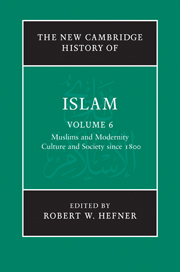Book contents
- Frontmatter
- 1 Introduction: Muslims and modernity: culture and society in an age of contest and plurality
- PART I SOCIAL TRANSFORMATIONS
- 2 New networks and new knowledge: migrations, communications and the refiguration of the Muslim community in the nineteenth and early twentieth centuries
- 3 Population, urbanisation and the dialectics of globalisation
- 4 The origins and early development of Islamic reform
- 5 Reform and modernism in the middle twentieth century
- 6 Islamic resurgence and its aftermath
- 7 The new transnationalism: globalising Islamic movements
- 8 Muslims in the West: Europe
- 9 Muslims in the West: North America
- 10 New frontiers and conversion
- PART II RELIGION AND LAW
- PART III POLITICAL AND ECONOMIC THOUGHT
- PART IV CULTURES, ARTS AND LEARNING
- Glossary
- Bibliography
- Index
- References
5 - Reform and modernism in the middle twentieth century
from PART I - SOCIAL TRANSFORMATIONS
Published online by Cambridge University Press: 28 March 2011
- Frontmatter
- 1 Introduction: Muslims and modernity: culture and society in an age of contest and plurality
- PART I SOCIAL TRANSFORMATIONS
- 2 New networks and new knowledge: migrations, communications and the refiguration of the Muslim community in the nineteenth and early twentieth centuries
- 3 Population, urbanisation and the dialectics of globalisation
- 4 The origins and early development of Islamic reform
- 5 Reform and modernism in the middle twentieth century
- 6 Islamic resurgence and its aftermath
- 7 The new transnationalism: globalising Islamic movements
- 8 Muslims in the West: Europe
- 9 Muslims in the West: North America
- 10 New frontiers and conversion
- PART II RELIGION AND LAW
- PART III POLITICAL AND ECONOMIC THOUGHT
- PART IV CULTURES, ARTS AND LEARNING
- Glossary
- Bibliography
- Index
- References
Summary
Introduction
An Egyptian student and his friends believed that a wave of atheism and debauchery flooded their country following the First World War. In their view, materialism, imperial occupation and weakness of religious leaders caused a crisis for Muslims. When this young man, Ḥasan al-Bannā (1906–49), received an assignment to teach in Ismailia, in the Suez Canal zone, he went with a determination to awaken people to ‘the enormous dangers confronting the very essence of their religion because of the advance of licentiousness and apostasy’. Preaching in coffee houses and in private homes, he gained a significant following. Then, in 1928, he joined others in establishing the Muslim Brotherhood (Al-Ikhwān al-Muslimīn). This organisation quickly became a well-known association dedicated to Islamic reform and its creation is a milestone in the emergence of new styles of Muslim organisations. The Muslim Brotherhood is in many ways the prototype of modern activist Islamic organisations.
The Brotherhood was not alone in the Muslim world during the fifty years after the First World War as an organisation dedicated to religious renewal. From South-East Asia to North-West Africa, people like al-Bannā worked to counter what they believed to be Muslims’ weakness in the face of Western military power and the challenges of modernity. The movements took many forms but these individuals and groups are not simply a stubborn conservative resistance to encroaching modernity. Instead, they are a dynamic part of the modern experiences of the Muslim world.
- Type
- Chapter
- Information
- The New Cambridge History of Islam , pp. 148 - 172Publisher: Cambridge University PressPrint publication year: 2010

